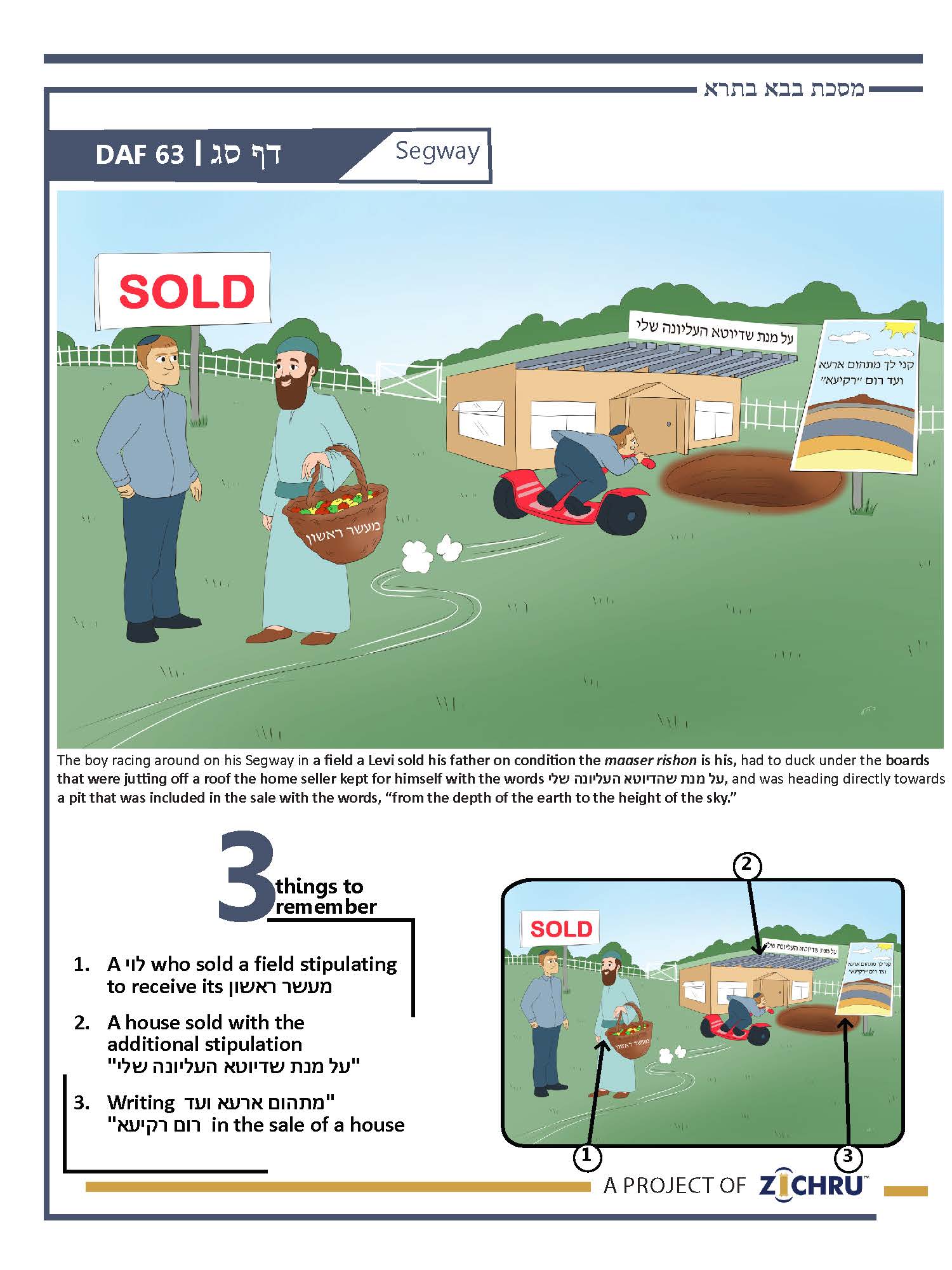Bava Basra - Daf 63
- Audio Timestamps
0:00 - The 3 Sugyos
2:50 - Review of 3 Sugyos
5:32 - Siman
8:25 - 4 Blatt Back Chazarah
14:48 - Pop Quiz (Last 7 blatt)
For access to all Zichru resources including PDFs, and illustrations CLICK HERE
- A לוי who sold a field stipulating to receive its מעשר ראשון
A Baraisa teaches that if a Levi sells a field to a Yisroel and stipulates: על מנת שמעשר ראשון שלי – “The sale is with the condition that its maaser rishon is mine,” מעשר ראשון שלו – then the maaser rishon is his. If he said, לי ולבניי – “The sale is with the condition that the maaser rishon is mine, and my children’s after I die,” מת יתן לבניו – then if he dies, [the Yisroel] gives the maaser to his children.
The Gemara wonders why this stipulation is effective: אין אדם מקנה דבר שלא בא לעולם – but a person cannot transfer ownership of something that has yet not come into existence!? Since the maaser does not yet exist, and he cannot transfer it to someone else, how can he exclude it from the sale!? The Gemara answers that since he made the condition to keep the maaser, which would normally be ineffective, we say שיורי שייריה למקום מעשר – he retained for himself the place of the maaser, i.e., ownership of the land for its future maaser. Since the land exists, the condition is effective.
- A house sold with the additional stipulation "על מנת שדיוטא העליונה שלי"
The above Baraisa taught that if an added term is ineffective as is, it is reinterpreted so that it should be effective. Reish Lakish says: זאת אומרת – this Baraisa teaches המוכר בית לחבירו ואמר לו – that if one sells a house to his fellow and tells him, על מנת שדיוטא העליונה שלי – “The sale is with the condition that the upper story is mine (i.e., the roof enclosed with a ten-tefach fence),” דיוטא העליונה שלו – then the upper story is his. Since this additional stipulation is unnecessary, because the Mishnah on Daf 61a taught that a seller retains such a roof anyway, it is interpreted to retain additional rights. The additional benefit is explained in two ways. Rav Zevid says: שאם רצה להוציא בה זיזין מוציא – it means that if [the seller] wants to project beams from [the roof], he may, although it extends into the airspace of the chatzeir which the buyer now owns (because the seller retains rights in the chatzeir to project beams into it). Rav Pappa says: שאם רצה לבנות עלייה על גבה בונה – it means that if he wants to build an upper story on top of it, he may, i.e., he may rebuild the roof if it collapses.
- Writing "מתהום ארעא ועד רום רקיעא" in the sale of a house
Rav Dimi from Nehardea said that if one sells a house, even if he wrote to include "עומקא ורומא" – the “depth and height” of the house in the sale, he must write: קני לך מתהום ארעא ועד רום רקיעא – “Acquire for yourself from the depth of the earth to the height of the sky” if he wants to include the house’s pit in the sale. Writing the phrase "עומקא ורומא" alone is insufficient. Normally, a buyer would not acquire the “depth and height” of the house itself (the Rashbam explains that the seller would normally retain the right to dig under the house or build on top of it, provided it does not damage the house). Therefore, אהני עומקא ורומא למיקנא עומקא ורומא - the additional clause “depth and height” is effective to transfer the house’s depth and height to the buyer, but not its pits, which serve a different function than the house. The broader additional clause, “מתהום ארעא ועד רום רקיעא”, is effective to transfer ownership of these pits, cisterns, and tunnels (the “height of the sky” does not add anything and is used merely to parallel the first phrase).
Siman - Segway
The boy racing around on his Segway in a field a Levi sold his father on condition the maaser rishon is his, had to duck under the boards that were jutting off a roof the home seller kept for himself with the words על מנת שהדיוטא העליונה שלי, and was heading directly towards a pit that was included in the sale with the words, “from the depth of the earth to the height of the sky.”


